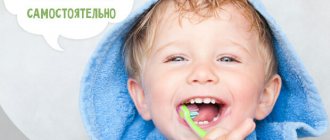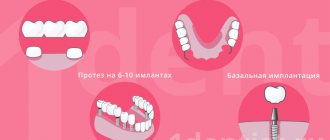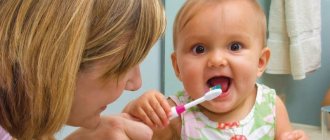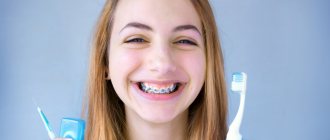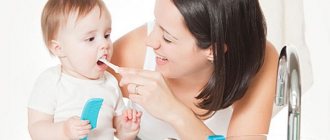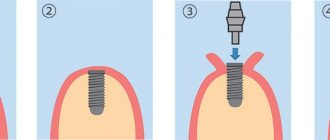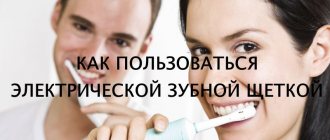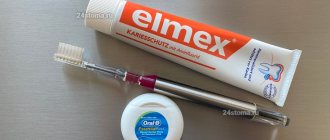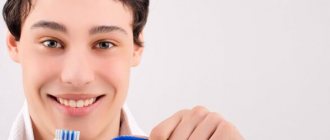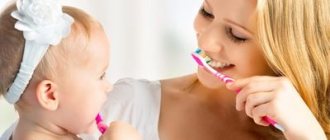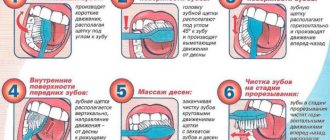In dentistry, as in any human activity, there are a number of controversial issues and unresolved issues. For example, how many times should you brush your teeth a day? At one time we were taught that brushing 3 times a day is the norm, then we agreed that too frequent grinding of teeth leads to abrasion of the protective enamel, which is fraught with dental problems, and we began to be taught to brush our teeth exclusively in the morning and evening.
So the second controversial question arose: is it better to brush your teeth before breakfast or after breakfast ? Naturally, there are no questions about brushing your teeth in the evening: before bed, after dinner - brushing your teeth will be most effective. But how to brush your teeth in the morning: before and after breakfast? When will this procedure be most effective?
Why should you brush your teeth?
The oral cavity, in which the teeth are actually located, is the most infected of all cavities of the human body, and insufficient care for it can lead to dire consequences. Leftover food under the influence of bacteria will be subject to decay, rotting and fermentation. In addition, soft plaque will release acid, which destroys the enamel, resulting in the formation of caries. All this harms not only the teeth, but can also provoke diseases of the internal organs, reduce the body’s defenses and become a source of bad breath.
Do you need to brush your teeth? Of course, it's up to you to decide. Even ancient people, not knowing about the danger of caries, tried to clean their teeth after eating with the help of homemade toothpicks in the form of grass stems and chewed sticks. Unfortunately, throughout the existence of mankind, it has not been possible to teach everyone to take care of their oral cavity. It is still not uncommon to find “instances” who believe that brushing your teeth is a completely useless activity. For example, in China, half of the rural population has never even held a toothbrush in their hands. It is clear that the price for such negligence is the loss of teeth, and a toothless person has never been a role model in developed societies.
Brushing your teeth before breakfast
- The amount of saliva secreted during sleep is much less than during the day. Therefore, overnight the acidity in the mouth increases, microorganisms multiply and accumulate more actively. If you have breakfast with unbrushed teeth, harmful microbes can enter the esophagus and stomach.
- Due to unpleasant sensations in the oral cavity in the morning, you always want to thoroughly brush your teeth and freshen your breath before eating.
- Toothpastes and powders contain fluoride-containing substances that protect tooth enamel from the effects of fruit and other acids contained in foods included in the breakfast menu. If your teeth are brushed before breakfast, it means they will no longer be subject to the destructive influence of external factors.
How to brush your teeth correctly?
Improper brushing of teeth is a phenomenon whose scale is enormous. Almost all of us do not know how to brush our teeth the way we should. Despite the apparent simplicity of the process, there are a lot of “nominal” methods of brushing teeth in the world. All of them differ in the nature of movements, sequence and position of the brush relative to the teeth or gums. For example, the famous dentist Reite suggested placing the toothbrush at an angle of 90 degrees, and Stillman distinguished himself by recommending that when brushing your teeth, press as hard as possible on the gums. Fortunately, modern dentists have taken only the best from the works of their colleagues and reduced it to a few general rules on how to brush your teeth:
- The cleaning itself should last at least 3 minutes;
- The brush should be held at an angle of 45 degrees relative to the teeth and gums;
- In order not to spread germs throughout the oral cavity, it is recommended to divide the procedure into two parts: first brush the lower dentition, and then the upper one;
- You should start with the front teeth, gradually moving to the back teeth;
- The lower teeth are brushed from bottom to top, and the upper teeth from top to bottom;
- The chewing surface of the teeth is processed in a circular motion;
- After rinsing your mouth, don't forget to clean your tongue, where a lot of germs also accumulate. Remember that the tongue is covered with plaque, which is the same breeding ground for microbes as deposits on the teeth;
- At the end of the procedure, it is recommended to use mouth rinses;
It is recommended to brush your teeth twice a day: after breakfast and dinner. This is a classic of oral hygiene. But it’s no secret that the habit of carrying out hygiene procedures before the morning meal is not so uncommon. Many older people are accustomed to brushing their teeth in the morning before eating. They will have to do this after breakfast, or change their habit. Since no one can brush their teeth in a dream, in the evening brushing is done after dinner or the last meal. Of course, ideally you should brush your teeth even after lunch, but this is not always possible. You can get out of the situation by simply rinsing your mouth or chewing gum for 10 minutes, but no longer!
How to use an irrigator correctly
The first step is to fill the reservoir with liquid.
There are special rinses and balms for the irrigator, but if they are not available, you can pour filtered boiled water. At the beginning of use, it is recommended to set the power of the irrigator to a minimum in order to prevent injury to the gums by a strong jet of water. You can gradually increase the pressure so that the procedure is comfortable. The irrigator is placed in the oral cavity, leaving a distance of several millimeters between the nozzle and the teeth. It is better to keep your mouth slightly open. Start cleaning from distant areas, moving the nozzle to the middle. The jet is directed from the gum to the crown at an angle to clean the enamel surface from plaque. Then - into the gum pocket to remove washed away plaque. You need to linger on the interdental spaces for a few seconds.
Dentists advise using the irrigator once a day. If teeth are prone to increased plaque and tartar formation, you can use the irrigator more often, including after meals. However, this device should not be abused, since too frequent exposure to a stream of water under pressure can disrupt the tight fit of the gums to the teeth, thereby increasing the distance between the teeth and gums.
After each use, it is necessary to rinse the irrigator with water, dry it and store it in a dry place. It is recommended to wash the irrigator once a month using special cleaning products.
I brush my teeth with this brush
A good toothbrush plays a key role in maintaining oral hygiene. So you need to choose it carefully. The first thing you should focus on is the degree of rigidity. Those who are confident in the strength of their gums can use. Their rigidity provides the most powerful cleansing of plaque. But it should be preferred if you are predisposed to bleeding gums, so as not to further injure them. If this problem bothers you greatly, then you should think about starting treatment for gingivitis. But the most versatile brushes to use are medium-hard brushes. They suit most people. Remember that the cleaning head of the toothbrush should not be large, otherwise its effectiveness will be reduced.
When choosing between a regular brush and an electric one, know that experts have not proven which one will be healthier for your teeth. The definite advantage of an electric brush is that it is easier to use and also more convenient for the elderly and children. Otherwise, its benefits depend on how you manage it. An ultrasonic brush is considered the most effective. It usually has several ultrasound frequencies, which allows it to kill bacteria not only on the surface, but also at a depth of 5 mm under the gum. This will be a good addition to a set of measures for the treatment of periodontitis. Any, even the best toothbrush should be changed every 3-4 months.
How to find a compromise
While doctors are arguing: when you need to brush your teeth - before breakfast or after, it is better to choose the rational grain from both options and put it into practice.
- Brush your teeth both before and after eating. This option is suitable only for the lucky owners of strong, healthy teeth with good enamel. If you are unsure about your teeth, it is better to consult a dentist.
- Brush your teeth no later than half an hour before eating, and immediately before sitting down at the table, rinse your mouth with plain clean water.
- In the morning, instead of brushing your teeth, use a decoction of medicinal herbs or a ready-made balm for rinsing.
It is necessary to remove the plaque that has formed on the tongue overnight. Attention! Green tea is a good natural antimicrobial agent. You can drink a cup of it before meals and several times during the day. - Properly selected, high-quality, modern antibacterial toothpaste helps protect teeth for 12-24 hours from exposure to harmful environments, microorganisms, and acids.
Brushing your teeth both before and after eating – this issue gives rise to a lot of controversy.
The optimal solution is to brush your teeth in the morning before breakfast, and after breakfast, rinse your mouth with water or a salt solution. Whatever option is chosen from the two proposed, the main goal is to keep teeth healthy for many years. The quality of chewing and assimilation of food, and therefore the health of internal organs, depends on their condition. Everything else depends on the individual preferences and desires of the person.
Which toothpaste should I use to brush my teeth?
The main purpose of toothpastes is to enhance the cleaning effect of the mechanical action of a toothbrush on the teeth. Therefore, they are based on foaming agents and abrasives. However, toothpastes not only help cleanse the surface of the teeth, but also have a preventive and therapeutic effect, for which active substances are added to them. Many people wonder which toothpaste is best for brushing their teeth. The answer is simple - the one that suits you best.
When choosing a paste, you need to focus on the problems that bother you. For example, people with sensitive teeth may benefit from non-abrasive toothpastes containing potassium chloride or strontium chloride. For those who have gum problems, toothpastes with anti-inflammatory and antibacterial effects are recommended. For the general prevention of caries and periodontal diseases, each of us should brush our teeth with toothpastes containing fluoride. But you shouldn't use them all the time. Pastes with fluoride should be alternated with pastes without it, which will also be useful for people with fluorosis (dental disease caused by an excess of fluoride in drinking water).
Important point! For complete teeth cleaning, just a 5 mm strip of toothpaste is enough.
How else to maintain dental health: floss or irrigator?
A modest set of toothbrush and toothpaste is the bare minimum, which does not guarantee reliable protection against caries. Therefore, it is advisable to maintain dental health not only with its help.
Caries most often begins its destructive activity in hard-to-reach places between the teeth, where the brush cannot penetrate.
- Floss and irrigator are two effective devices that cope with high-quality cleaning of interdental spaces.
The irrigator is more suitable for wearers of braces and dentures, and is indispensable for certain gum diseases. And floss is inexpensive and simple; be sure to use it while brushing your teeth. Believe me, you will immediately feel how much cleaner your teeth have become.
Folk remedies for oral hygiene
Folk remedies for oral hygiene should be used with caution so as not to cause mechanical damage to tooth enamel or damage the gums. This especially applies to the recommendation to brush your teeth with soda or salt instead of toothpaste.
Attention! Traditional medicine for toothache recommends a decoction of sage, yarrow, and oak bark. Oak bark helps well with incipient periodontitis and gingivitis.
To eliminate bad breath - halitosis, it is recommended:
- rinse your mouth with 3% hydrogen peroxide several times a day;
- Dissolve a few drops of alcohol infusion of horseradish juice (root) in a glass of warm boiled water and use for rinsing;
- for the same purpose, use a decoction of herbs - mint, oregano, St. John's wort in a ratio of 4: 2: 2, 3 tablespoons per 0.3 liters of boiling water, leave;
- infusion of wormwood and St. John's wort;
- infusion with celery root in vodka – 1 tsp. per glass of water;
- 1 tsp salt for 2 tbsp. vegetable oil for rinsing;
- eat fried sunflower seeds;
- finish your meal with ground ginger - 0.5 tsp.
A natural antiseptic, parsley, helps relieve pain from stomatitis. You need to chew the leaf or rinse your mouth with its juice. Effective anti-inflammatory agents are decoctions of chamomile, calendula flowers, linden, and plantain leaves. Their use also helps heal wounds and mouth ulcers. It is good to massage the gums using fir, sea buckthorn, olive oils, and tea tree oil. Horseradish and celandine juice in decoctions and infusions should be used carefully, in small quantities.
Questions and answers on the topic
Question
Does it make sense to brush your teeth in the morning, before breakfast?
Answer 1
The most correct option is to rinse your mouth before breakfast in order to get the right taste sensations while eating, get rid of detritus and dead epithelial cells that have accumulated overnight, and then thoroughly brush your teeth 30-60 minutes after breakfast. If you brush your teeth immediately after eating, the natural component of tooth protection may be damaged (for example, lysozyme in saliva, which is especially active after eating and “works” in the film on tooth enamel), can be washed away.
Answer 2
The gold standard is to brush your teeth after breakfast and before bed. It is also necessary to floss between all teeth. If you brush your teeth before breakfast, then only to remove the biofilm of bacteria, and after eating, clean them thoroughly. Before breakfast, brush your tongue well; the taste sensation will be stronger if the papillae of the tongue are not covered with plaque. And thread at the first opportunity, but at least once a day.
Answer 3
The digestive process begins in the mouth - and brushing your teeth just before breakfast can kill the microflora necessary for this. Most likely, this will interfere with absorption or, at a minimum, complicate it and slow it down; the body will spend more resources, and the stomach will modestly hint to you about this.
Answer 4
Lysozyme will not be washed off anywhere. It's just, let's say, an antibacterial enzyme that is present in saliva. There is saliva, there is lysozyme. It's more about the pellicle. This is a thin film of salivary glycoproteins that forms within 20-30 minutes after brushing your teeth (when brushing, we “remove” it with a brush). Dental plaque is, simply put, an accumulation of microorganisms on the surface of the tooth, including pathogenic ones. So these same bacteria cannot attach to a “bare” tooth. They are attached specifically to the pellicle. That is, the formation of plaque will begin within half an hour after brushing your teeth. This is why there is a theory that you should brush your teeth before eating. Allegedly, you “clean off” the pellicle and the MO has nowhere to attach. However, a pellicle will still form over time (half an hour after cleaning), and during breakfast you will receive carbohydrates (sugars), which are a substrate for cariogenic microorganisms. These CMOs ferment carbohydrates to produce acids. The pH of the environment decreases. Conditions are created for the demineralization of enamel - the initial stage of caries (it is very complicated there, you can write a separate answer). It turns out that if we have breakfast and do not remove these carbohydrates by brushing, they will remain in the oral cavity as food for bacteria. So it's better to brush your teeth after eating. If you find it unpleasant to eat breakfast without brushing your teeth, you can rinse your mouth. And do not forget that brushing your teeth is not enough, it is important to do it correctly.
From the site https://thequestion.ru/
Acidic foods soften enamel
After conducting a study at one of the institutes in Germany, it was found that brushing your teeth immediately after drinking or eating something sour is not possible, since acidic foods temporarily soften the enamel. Although this effect only lasts 20-30 minutes, the enamel is then strengthened again.
If you think that the main enemy of enamel is sugar, then you are right. However, in addition to sugar, the acid contained in acidic foods and juices also has a destructive effect. For example, if you drink a glass of orange juice after a meal, then it is better not to brush your teeth for about half an hour.
The fact is that when consuming acidic foods, the acidity in the mouth becomes higher than normal, which results in softening of the enamel. To neutralize this process, you can eat foods containing large amounts of proteins - for example, peanuts, cheese, eggs. But they should be eaten 15–20 minutes after eating a high-acid meal.
Author of the article: Muravitsky Boris Viktorovich, dentist, especially for the site ayzdorov.ru
